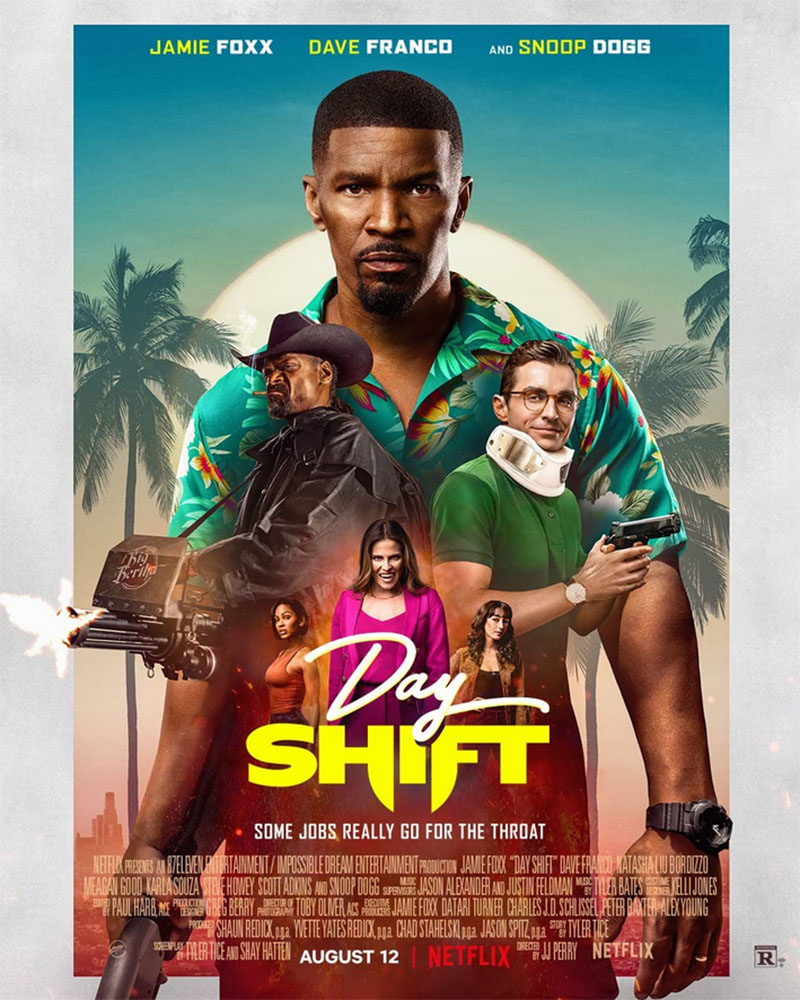According to well established Hollywood logic, any movie about a rule-breaking action hero needs to add nuance to his character by giving him a wife and a daughter to contextualise his character arc and provide some essential emotional robustness. The newly released “Day Shift” establishes this early on. Jamie Foxx’s Bud Jablonski is a rogue vampire hunter. He and his ex-wife (an incredibly misused Meagan Good as Jocelyn) have a cordial relationship, so much so that we’re not quite sure initially why there are divorced. But the cost of LA is prohibitive between payments on a gorgeous house and private school fees for his daughter (Zion Broadnax who is fairly charming as Paige). Jocelyn’s plans to move the pair to Florida gives Bud a timeline of a few days to scrounge up some money. This deadline sets the film in motion. The roguish Bud must return to the world of professional hunting with the Vampire Hunting Union, but the attempt to go straight goes awry when it turns out that Bud killed the daughter of a very powerful vampire. Chaos ensues, sort of.
Yes, one of the first rules of enjoying a deliberately silly piece of action-fantasy might be not expecting it to spend much time offering up a treatise on itself. There are at least three exposition-heavy scenes that are awkwardly placed just to allow the film a chance to explain things like vampire types, the rules of the union and how vampires appear in this world. But, in a world where there is an entire bureaucratic business of vampire hunting, “Day Shift” is often inexact about the rules of its world. Late in the film, Bud must reveal his job to someone who is not incredulous that he is a vampire hunter but seems just as nonplussed that vampires even exist. Indeed, even as the film initially positions vampires and humans as adversaries, later actions complicate this initial presentation in a way the film seems ambivalent about. I’m probably spending more time thinking through the ways to make sense of the logic of this world than the filmmakers. But then, “Day Shift” has a budget of US$100 million, and you must wonder: where did that money go?
J. J. Perry, martial artist and stuntman, directs his first feature with a script by Tyler Tice and Shay Hatten. Perry’s stuntman background makes for confident action set-pieces, although I’m not wholly convinced that they are proficient enough to counter the leaden forcedness of the rest of “Day Shift”. The opening fight sequence, where Bud takes on two vampires, is clearly shrewdly choregraphed and planned out but some of what makes it so engaging is the surprising way the vampires move compared to the usual presentation of vampires on film. Everything goes downhill from there, without any real ability to contextualising of what is at stake here. The fight scenes remain fine, but the predilection for slow-motion to emphasise something cool, and a weird overall dullness of the film’s aesthetics don’t do much to enhance the actual choreography. There’s also the fact that the film’s main script is working towards a jokey idea of action, chastening typically scary supernatural forces with humour but the films core – those action scenes – are not ever humorous. It makes for an incongruous union but more than that, even if “Day Shift” is credibly choreographed, the synthetic sunniness of its idea of LA, the underworld and the lore that come with it do not explain where its budget went.
It’s not that “Day Shift” is incessantly terrible, but it is only sporadically engaging. And even more concerning is that it feels consistently slapdash. Referencing in cinema can be a welcome way to add texture to a film but it never really feels like “Day Shift” is using allusion consistently. Instead, it feels like a film made of random scraps of pre-existing media, resulting in a narrative mush rather than anything with coherent energy.
This is especially clear in its approach to humour. Cowriter Shay Hatten, who provided a rewrite for Tice’s original script, was credited on last year’s slightly better “Army of the Dead,” another film trying to filter scary supernatural through humour. But even if “Army of the Dead” falters as it moves to its end, there’s a sense of completion to its approach to its world that’s clearly thought out. There’s this needling sense in “Day Shift” that’s it been created from top down – an idea that’s compelling but without any real ground up work. It just comes across as pointless. Things happen as they need to, and every figure does what is expected, depending on what the script needs. This is mirrored in the visual approach, where battle sequences play out more because certain figures must win than with any keen sense of setting up how the dynamics of movement and physical power work here.
Sure, the actors are committed. But these are professionals. Foxx is a dependable screen-presence, as always. Snoop Dogg appears in a mentor-role with the swagger that almost makes the antics on screen feel important. Dave Franco, probably the performer visibly trying the hardest, makes the most of a snivelling sidekick role with a late-film twist. But the film can’t meet any of them on any real level to offer anything that feels engaging enough to pay attention to. And it becomes turgid when the weaker performers (Scott Adkins and Karla Souza in particular) feel tiresome to watch. When Netflix is dismissed as offering content to watch in the background rather than actual movies, it’s probably something like “Day Shift” that comes to mind. It’s not actively without merit but it’s also so casual and careless about everything within its frame, it’s hard to know why to even bother with it.


